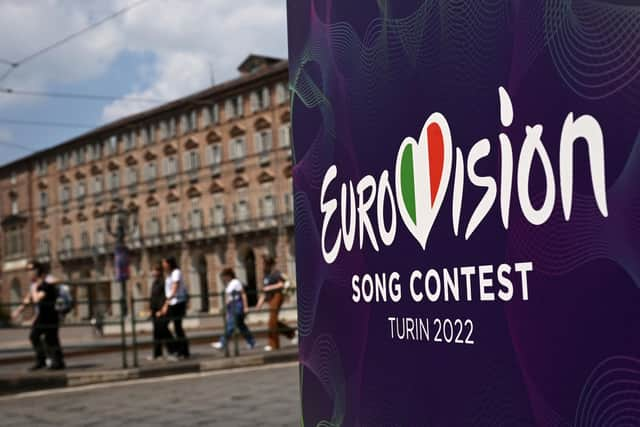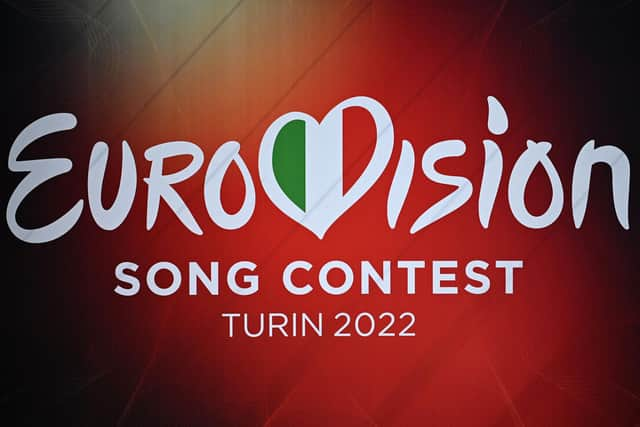Eurovision 2022: Tickets, how to watch, who is performing for the UK - and how voting works
and live on Freeview channel 276
Whether you go all out and dress up and watch the song contest with friends while enjoying a drink or two, or if you’re more of a casual watcher you’ll no doubt have questions.
Here’s our attempt to answer everything you ever wanted to know about the show.


When is Eurovision 2022?
Advertisement
Hide AdAdvertisement
Hide AdThe Eurovision Song Contest 2022 will start at 8pm on Tuesday, 10 May and ends on Saturday, 14 May.
The UK, France, Germany, Spain and Italy don’t have to go through the semi-final process and automatically qualify for the Grand Final on Saturday, 14 May.
MORE ENTERTAINMENT: Don’t Worry Darling: Trailer for Olivia Wilde film starring Harry Styles and Florence Pugh, plot and release date


Where is Eurovision 2022 taking place?
Eurovision 2022 is taking place in Turin, Italy after Italian rock band Maneskin won in 2021.
Are Eurovision 2022 tickets on sale?
Tickets for the 66th Eurovision Song Contest are still on sale - while tickets for the live show of the Grand Final are sold out you can still get tickets for the semi-finals through Ticketone.
Advertisement
Hide AdAdvertisement
Hide AdPrices range depending on where you want to sit, with reduced visibility tickets available from €20 and more expensive seats costing up to €100.
How to watch Eurovision 2022
The Eurovision semi-finals on May 10 and 12 can both be watched live on BBC Three, with Scott Mills and Rylan Clark commentating.
The Eurovision Grand Final will be broadcast on BBC One and BBC iPlayer and on BBC Radio 2 and BBC Sounds from 8pm on Saturday, 14 May.
Who is performing for the UK in Eurovision 2022?
The UK is being represented by Sam Ryder who will be performing ‘Space Man’.
Advertisement
Hide AdAdvertisement
Hide AdHe is a British singer and social media personality from Maldon.
Who else is performing in Eurovision 2022?
Albania: Ronela Hajati – Sekret
Armenia: Rosa Linn – Snap
Australia: Sheldon Riley – Not The Same
Austria: LUM!X feat. Pia Maria – Halo
Azerbaijan: Nadir Rustamli – Fade To Black
Belgium: Jérémie Makiese – Miss You
Bulgaria: Intelligent Music Project – Intention
Croatia: Mia Dimšić – Guilty Pleasure
Cyprus: Andromache – Ela
Czech Republic: We Are Domi – Lights Off
Denmark: REDDI – The Show
Estonia: Stefan – Hope
Finland: The Rasmus – Jezebel
France: Alvan & Ahez – Fulenn
Georgia: Circus Mircus – Lock Me In
Germany: Malik Harris – Rockstars
Greece: Amanda Georgiadi Tenfjord – Die Together
Iceland: Systur – Með Hækkandi Sól
Ireland: Brooke – That’s Rich
Israel: Michael Ben David – I.M
Italy: Mahmood & Blanco – Brividi
Latvia: Citi Zēni – Eat Your Salad
Lithuania: Monika Liu – Sentimentai
Malta: Emma Muscat – I Am What I Am
Moldova: Zdob şi Zdub & Frații Advahov – Trenulețul
Montenegro: Vladana – Breathe
Netherlands: S10 – De Diepte
North Macedonia: Andreas – Circles
Norway: Subwoolfer – Give That Wolf A Banana
Poland: Krystian Ochman – River
Portugal: MARO – Saudade Saudade
Romania: WRS – Llámame
San Marino: Achille Lauro – Stripper
Serbia: Konstrakta – In Corpore Sano
Slovenia: LPS – Disko
Spain: Chanel – SloMo
Sweden: Cornelia Jakobs – Hold Me Closer
Switzerland: Marius Bear – Boys Do Cry
Ukraine: Kalush Orchestra – Stefania
Are Eurovision songs original?
As part of the rules of the Eurovision song contest, the submitted songs (lyrics and music compositions) must be original and must not have been released and/or publicly performed in part or in full before the release date.
Are Eurovision performances live or mimed?
Each act must sing live, while no live instruments are allowed.
Can Eurovision winners compete again?
You can enter the same act more than one - the only person to have won more than once as a performer is Ireland's Johnny Logan, who performed "What's Another Year" in 1980 and "Hold Me Now" in 1987.
How does Eurovision voting work?
Advertisement
Hide AdAdvertisement
Hide AdAfter all songs have been performed, each country will give two sets of 1 to 8, 10 and 12 points; one set given by a jury of five music industry professionals, and one set given by viewers at home. Viewers can vote by telephone, SMS and through the official app. Out of fairness, you cannot vote for your own country.
In the Grand Final, juries and viewers from all participating countries can vote again, after the 26 finalists have performed.
Once the voting window has closed, the presenters will call upon spokespersons in all participating countries and ask them to reveal their jury points live on air.
Next, viewers' points from all participating countries will be added up, and revealed from the lowest to the highest, culminating into a climax that will eventually reveal the winner of the 64th Eurovision Song Contest.
What does the Eurovision winner get?
Advertisement
Hide AdAdvertisement
Hide AdThe winner gets to perform once again, and takes home the iconic glass microphone trophy.
The winning country will traditionally be given the honour of hosting the next Eurovision Song Contest.
When did Eurovision start?
The first Eurovision Song Contest took place on May 24, 1956 and involved seven nations.
The Contest was based on Italy's Sanremo Music Festival and was designed to test the limits of live television broadcast technology.

